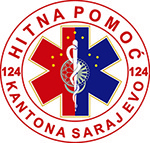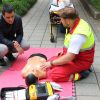The phone rings a maximum of three times, and the dispatcher who answers must assess the degree of urgency, ie whether the patient is vitally endangered, whether he is potentially endangered or whether it is something else. He determines this with a series of questions, and then deploys the teams of Htina help KS that are closest to the given location.
"At any moment, there is a doctor in the center who is an emergency medicine specialist who has five to 10 years of work experience in the profession and two technicians with 10 years of work experience in the field. That field experience is needed to be able to distribute teams according to the degree of vulnerability. They have been trained to work in the dispatch center and use mobile stations ", said Adem Zalihić, director of the Public Institution Ambulance KS.
Sort by urgency
All ambulance crews are connected to the dispatch center and other colleagues via a mobile connection. In front of the dispatcher there is a monitor with a GPS system so that they know where each vehicle is at all times.
"It is a very demanding and dynamic workplace that often leads to the fact that this responsible person, primarily a doctor, is in great trouble to classify the existing capacities according to the degree of vulnerability. We are listening to you, someone is panicking about a banal thing, and someone is saying quite nonchalantly, "my chest hurts", and when we come, it turns out that the person has a heart attack ", said Zalihić.
In addition to the mobile connection, they have phones 124 and 033 611 111, and they also receive messages through which deaf-mute people can contact them. There are 12 phones available at any one time. KS ambulance covers the area from Ivan-sedlo to Ilijaš, and all calls are received in the center and they are further distributed.
"Every conversation is recorded due to possible criminal proceedings. It is recorded when the call is received, the time of sending the team, the arrival of the team at the scene, departure from the scene, and if transport to the hospital, then the time of arrival at the hospital, because it is a forensic document for possible processing, "he said. is Zalihic.
A stressful job that requires concentration
This is a very stressful job that can only be done by physically and mentally fully prepared people. It takes a lot of concentration and experience to know what questions to ask, how to communicate with the caller, and how to respond. Each shift supervisor delegates to the expert council and recommends persons who can do the job of dispatcher.
A big problem is calls that have nothing to do with emergency medicine, which often happens.
"Ambulance is doing its job at a high level. We try to be as professional as possible because we are here for the citizens. We always try to act in accordance with medical ethics and provide help to those who need it most at a given moment. "Unfortunately, there are citizens who abuse it, there are also those who joke, and that is not right and it is very irresponsible," Zelihic said.
Saved many lives
Shift Chief Prim. Dr. Tihomir Bera said that the dispatch center works according to European standards and guidelines in triage and according to the positive experiences of European countries and beyond.
"When you receive a call, you have to assess whether it is an absolute threat to life or something else, the third and fourth order of urgency. It is very important to assess who is life-threatening. We never saved anyone from death, we just helped life win at that moment and that life went on. There are a lot of people walking around KS who were lucky that the teams could intervene, because we have really good equipment ", said Bera.
He stressed that citizens should understand that they are not a taxi service, because they often call them and say just let someone come, and then the dispatcher must find a way to reach the caller and find out what it is about. People rarely want to talk because they feel it is implied that it is an emergency.
“Telefon zvoni i 1.000 puta, imamo više od 120 intervencija. Ljudi koji tu rade nisu krivi kada se vama nešto desi i nema razloga da im prijetite, psujete i vrijeđate ih, jer oni su tu da vama pomognu. Razumijemo stres, kada mlad čovjek dobije infarkt i ostale stresne situacije, ali ne razumijemo nekoga ko je 15 dana bolestan i 16. dan zove Hitnu pomoć jer sutra ide na more”, rekao je Bera.
Do 20 posto lažnih poziva
Naglašava kako je minimalno 20 posto lažnih poziva, a da poseban problem imaju nakon što je emitovana humoristična serija u kojoj lik zove hitnu govoreći “Halo, je li to hitna? Hitno mi treba 100 KM”.
"After that, we have a lot of calls. These are serious things. "Human lives are not funny," he concluded.
taken from www.klix.ba




